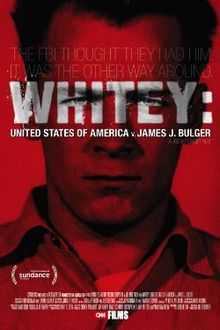Whitey: United States of America v. James J. Bulger
| Whitey: United States of America v. James J. Bulger | |
|---|---|
 Sundance Film Festival poster | |
| Directed by | Joe Berlinger |
| Produced by |
Joe Berlinger Caroline Suh |
| Music by | Wendy Blackstone |
| Cinematography |
Robert Richman Étienne Sauret |
| Edited by |
Alex Horwitz Joshua L. Pearson |
Production company | |
Release dates |
|
Running time | 129 minutes[1] |
| Country | United States |
| Language | English |
| Box office | $75,644[2] |
Whitey: United States of America v. James J. Bulger is a 2014 American biographical documentary film produced and directed by Joe Berlinger. The film is produced by CNN Films and Radical Media.[3] The film had its world premiere at 2014 Sundance Film Festival on January 18, 2014.[4][5]
Synopsis
Narrating the trials of gangster James 'Whitey' Bulger, using the legal proceedings as a springboard to explore allegations of corruption within the highest levels of law enforcement.
Critical reception
After its premiere at the Sundance Film Festival, the film received mostly positive reviews from critics. Steve Greene of Indiewire grade the film A- and said that "As a primer on both the case and Bulger's career as a mob leader, "Whitey" offers a comprehensive look at a saga that — despite the conclusion of the 2013 trial — still feels unresolved."[6] Drew Talor in his review for The Playlist praised the film by comparing it with Berlinger's 1996 documentary film Paradise Lost: The Child Murders at Robin Hood Hills that "It might not be the same emotional sucker punch that “Paradise Lost” was, but in a strange way 'Whitey' might be more tragic."[7] Raffi Asdourian of The Film Stage in his review said that "The film weaves together an ornate tapestry of corruption that is a comprehensive exploration of a very complicated case. Insightful and revelatory, this documentary will surely fascinate anyone with any interest about the case or learning about the man who inspired Jack Nicholson's character in The Departed."[8]
However, John DeFore of The Hollywood Reporter gave the film a negative review, saying, "Sprawling and sometimes a grind at over two hours, the doc is both cinematically uninspired and journalistically jumbled, muddying its potent main arguments."[1]
References
- ↑ 1.0 1.1 "Whitey: United States of America V. James J. Bulger: Sundance Review". Retrieved March 18, 2014.
- ↑ http://www.boxofficemojo.com/movies/?id=whitey.htm
- ↑ "‘Whitey’ Bulger heard in rare audio from documentary". Retrieved March 18, 2014.
- ↑ "Whitey: United States of America v. James J. Bulger, Director Joe Berlinger". Retrieved March 18, 2014.
- ↑ "Film explores crimes of Bulger, complicity of FBI". Retrieved March 18, 2014.
- ↑ "Sundance Review: Joe Berlinger's 'Whitey' is a Captivating, Comprehensive Look at the Whitey Bulger Saga". Retrieved March 18, 2014.
- ↑ "Sundance Review: Director Joe Berlinger’s Riveting True Crime Doc ‘Whitey: The United States Vs. James J. Bulger’". Retrieved March 18, 2014.
- ↑ "Sundance 2014 Documentary Wrap-Up: ‘Whitey,’ ‘Internet’s Own Boy,’ ‘Battered Bastards,’ ‘Electric Sky’ & More". Retrieved March 18, 2014.
External links
- Whitey: United States of America v. James J. Bulger at the Internet Movie Database
- Whitey: United States of America v. James J. Bulger at AllMovie
- Whitey: United States of America v. James J. Bulger at Rotten Tomatoes
| ||||||||||||||||||
| ||||||